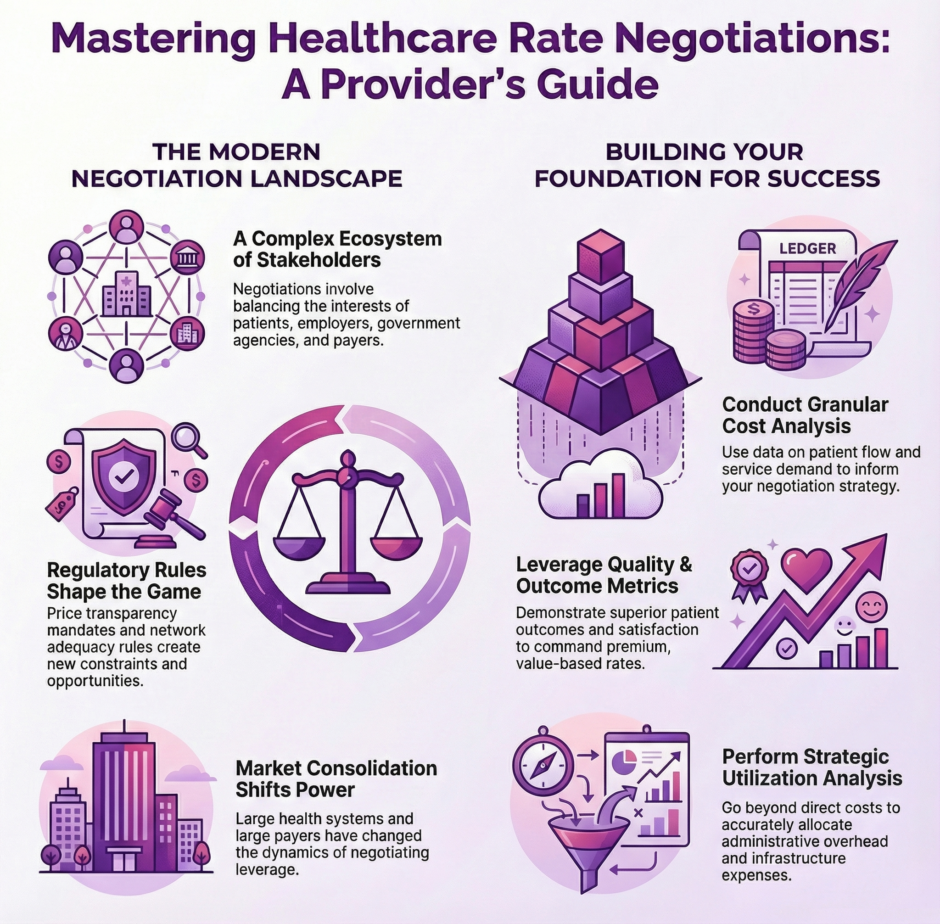
Healthcare providers face a fundamental challenge that touches every aspect of their operations: securing fair reimbursement rates that support quality patient care while maintaining financial sustainability. Rate negotiations represent one of the most critical business processes in healthcare, yet many providers approach these discussions without the strategic framework necessary to achieve optimal outcomes.
The difficulty of rate negotiations extends far beyond simple price discussions. These conversations involve intricate analyses of market conditions, quality metrics, operational costs, and regulatory requirements. Success requires understanding not just what rates you need, but why you deserve them and how to present compelling arguments that resonate with payers who face their own financial pressures and regulatory constraints.

Modern healthcare rate negotiations occur within an environment of increasing scrutiny and transparency. Gone are the days when providers could simply request rate increases based on general cost inflation or market comparisons. Today’s negotiations demand sophisticated data analysis, compelling value propositions, and strategic positioning that demonstrates clear benefits to all stakeholders in the healthcare ecosystem.
The Rate Negotiation Terrain
Rate negotiations in healthcare operate within a unique framework that distinguishes them from typical business pricing discussions. The involvement of multiple stakeholders, including patients, employers, government agencies, and regulatory bodies, creates a complex web of interests that must be balanced carefully. Knowing this ecosystem is crucial for developing effective negotiation strategies.
 The regulatory environment significantly influences rate negotiation dynamics. Federal and state regulations govern everything from network adequacy requirements to transparency mandates, creating both opportunities and constraints for providers seeking rate improvements. Recent price transparency rules have fundamentally altered the negotiation landscape by making previously confidential pricing information more accessible to competitors and consumers.
The regulatory environment significantly influences rate negotiation dynamics. Federal and state regulations govern everything from network adequacy requirements to transparency mandates, creating both opportunities and constraints for providers seeking rate improvements. Recent price transparency rules have fundamentally altered the negotiation landscape by making previously confidential pricing information more accessible to competitors and consumers.
Market consolidation trends have shifted negotiation power dynamics in many regions. Large health systems often enjoy enhanced negotiating leverage due to their market position and ability to offer comprehensive service portfolios. However, specialized providers and those in underserved areas may still maintain significant bargaining power despite their smaller size. Recognizing your position within these market dynamics is essential for crafting appropriate negotiation approaches.
Payer consolidation has similarly impacted negotiation processes. Larger insurance companies bring sophisticated analytical capabilities and standardized negotiation processes that require equally sophisticated responses from providers. Knowing how different payers approach rate negotiations helps tailor strategies that align with their decision-making processes and priorities.
Building Your Foundation for Success
Successful rate negotiations begin long before formal discussions commence. The foundation for effective negotiations is built through exhaustive data collection, analysis, and strategic planning that positions your organization as an indispensable partner rather than just another cost center.
 Cost analysis represents the cornerstone of any rate negotiation strategy. However, many providers underestimate the complexity of accurately calculating true service costs. Direct costs like physician salaries, medical supplies, and equipment are relatively straightforward to quantify. The challenge lies in appropriately allocating indirect costs such as administrative overhead, facility maintenance, technology infrastructure, and regulatory compliance expenses.
Cost analysis represents the cornerstone of any rate negotiation strategy. However, many providers underestimate the complexity of accurately calculating true service costs. Direct costs like physician salaries, medical supplies, and equipment are relatively straightforward to quantify. The challenge lies in appropriately allocating indirect costs such as administrative overhead, facility maintenance, technology infrastructure, and regulatory compliance expenses.
Activity-based costing methodologies provide more accurate cost calculations by tracing expenses directly to specific services or patient populations. This approach reveals the true profitability of different service lines and helps identify areas where current reimbursement rates may be inadequate. Without this granular understanding, providers risk accepting rates that appear reasonable on the surface but actually result in financial losses.
Quality metrics have become increasingly important in rate negotiations as the healthcare industry continues its shift toward value-based care. Providers who can demonstrate superior outcomes, reduced complications, lower readmission rates, and high patient satisfaction scores are positioned to command premium rates. These metrics must be carefully tracked, benchmarked against regional and national standards, and presented in formats that clearly communicate value to payers.
Utilization analysis provides insights into patient flow patterns, service demand, and capacity utilization that inform negotiation strategies. Knowing which services are experiencing growth, which patient populations generate the most activity, and how utilization patterns compare to historical trends helps predict future revenue implications of different rate structures.
Rate Negotiation through Medwave
Transform your healthcare organization’s financial future with our rate negotiation services. At Medwave, our experienced team of healthcare finance experts works directly with insurance payers on your behalf, leveraging deep industry relationships and proven negotiation strategies to secure the fair reimbursement rates your organization deserves. We understand that rate negotiations can be time-consuming, complex, and often frustrating for busy healthcare administrators who need to focus on patient care rather than wrestling with insurance companies over contract terms.
 That’s where we step in as your dedicated advocate, handling every aspect of the negotiation process from initial preparation through final contract execution. Our specialists bring decades of combined experience in healthcare reimbursement, intimate knowledge of payer priorities and decision-making processes, and the persistent, professional approach necessary to achieve meaningful rate improvements.
That’s where we step in as your dedicated advocate, handling every aspect of the negotiation process from initial preparation through final contract execution. Our specialists bring decades of combined experience in healthcare reimbursement, intimate knowledge of payer priorities and decision-making processes, and the persistent, professional approach necessary to achieve meaningful rate improvements.
We start by conducting a thorough analysis of your current contracts and financial performance to identify opportunities for enhancement, then develop customized negotiation strategies tailored to each payer relationship and your organization’s unique market position. Throughout the negotiation process, we maintain transparent communication with your leadership team, providing regular updates on progress and seeking input on key decisions while managing all the detailed discussions and paperwork that successful negotiations require.
Our track record speaks for itself, healthcare organizations partnering with us consistently achieve better reimbursement outcomes than they could accomplish independently, often seeing rate improvements that more than offset our service fees within the first contract cycle.
Don’t let inadequate reimbursement rates threaten your organization’s ability to provide quality patient care and maintain financial stability, let our proven rate negotiation expertise secure the fair compensation your healthcare services deserve.
Contact us to handle all of your rate negotiation needs and/or challenges.
